British GP: Nico’s gearbox problem – is he stuck in reverse?
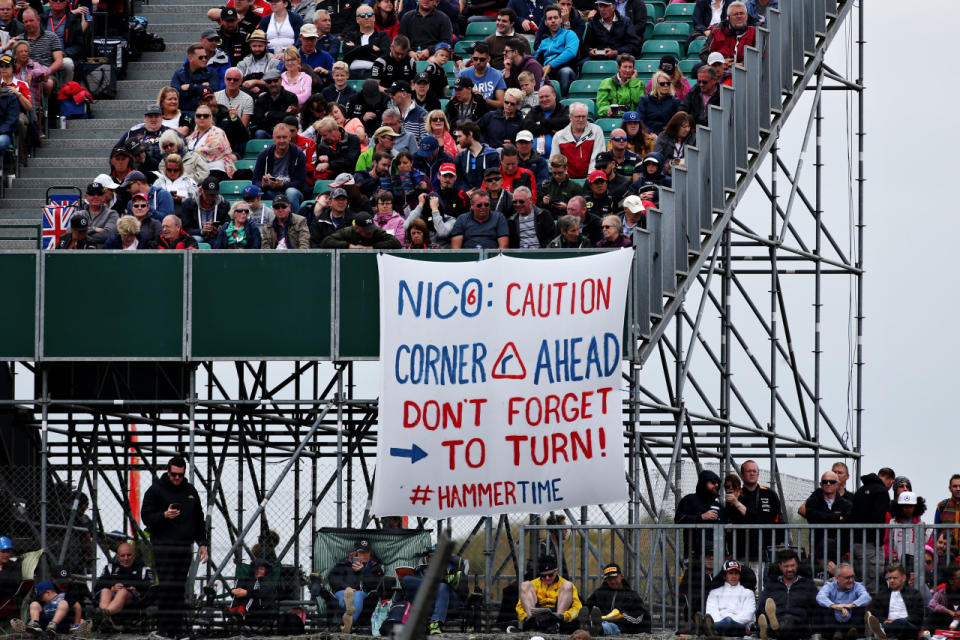
It’s an odd position in which Nico Rosberg finds himself: leading the championship as the season approaches halfway, but seemingly destined to finish second.
To rub salt in his wounds, at Silverstone, his team break the radio communication rules and land him with a ten-second penalty, that promotes Verstappen to second and slashes Rosberg’s championship lead to a single, miserable, point.
Meanwhile, his team-mate continues to look like a man marching towards another title – or crowdsurfing to that title, if Lewis Hamilton’s post-race celebrations at Silverstone are anything to go by (see below).
Hamilton’s victory was anything but surprising – in fact, the major talking points of the 2016 British Grand Prix came from F1’s fiendishly complex rules, and their interpretation.
That’s not to say there wasn’t any action, far from it, but the headlines will be about two things: Hamilton’s win, and Mercedes’ cheating.
So what did we learn from the race..?
Go home, F1 rule makers, you’re drunk
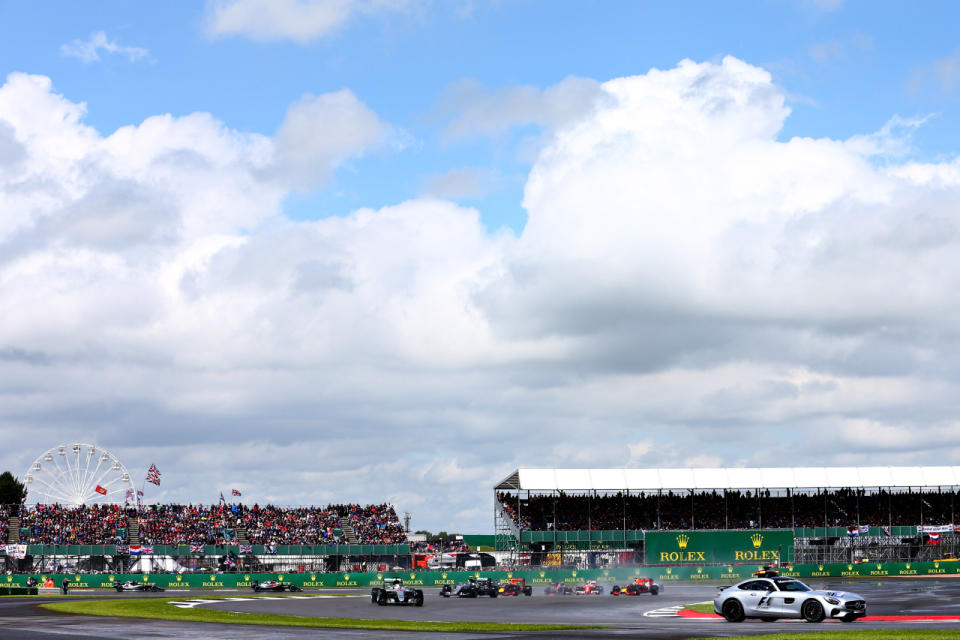
The race began with a controversy over rules, ended with a controversy over rules, and was peppered with controversy over rules.
Fair enough, it’s F1 not tennis, and there’s a bit more to our sport than busting balls and grunting. Well, perhaps.
First up, the start. Five wet laps behind a safety car (pictured) and then, miraculously, it’s dry enough for half the grid to immediately switch to intermediate tyres.
Did I miss something? Were there sharks loitering in the puddles?
Not only did the safety car start deny a huge crowd the show they’d paid to see, it pretty much guaranteed that Hamilton would win.
Hamilton’s starts have been his biggest weakness this season – do away with the start and you do away with the best chance anyone has of passing him.
You also do away with what is often the most exciting few seconds of racing all weekend. I can tell you now, if you’ve coughed up a few hundred quid to come enjoy a bit of F1, that really hurts.
And you could hear how frustrated the drivers were, with transmission after transmission urging Race Director Charlie Whiting to, well, direct a race rather than a vaguely damp track parade.
Not good enough.
Then there were some illustrations of how inconsistent the penalties drivers face can be.
Jolyon Palmer was slapped with a ten-second penalty after Renault sent him on his way with three wheels. Insert your own ‘wheels coming off team Renault’ comment here.
It was an utterly pointless penalty – if you want to punish a team for putting life at risk, ten seconds isn’t where it’s at.
And, let’s face it, Palmer had already lost so much time in the chaos of pitting and reversing to pick up an additional wheel, that ten seconds was of no significance whatsoever.
In contrast, later in the race, Sebastian Vettel squirmed his way past Massa, driving him off the track in the process.
Now, either it was a racing incident – unfortunate, but these things happen – or it was an illegal manoeuvre which he shouldn’t benefit from.
Vettel was handed a five-second penalty – if he’d been stuck behind Massa, he’d have lost a lot more than five seconds. The message this penalty sent out was: this is a rule that’s worth breaking.
But then there was the big rule controversy…
Radio ga-ga
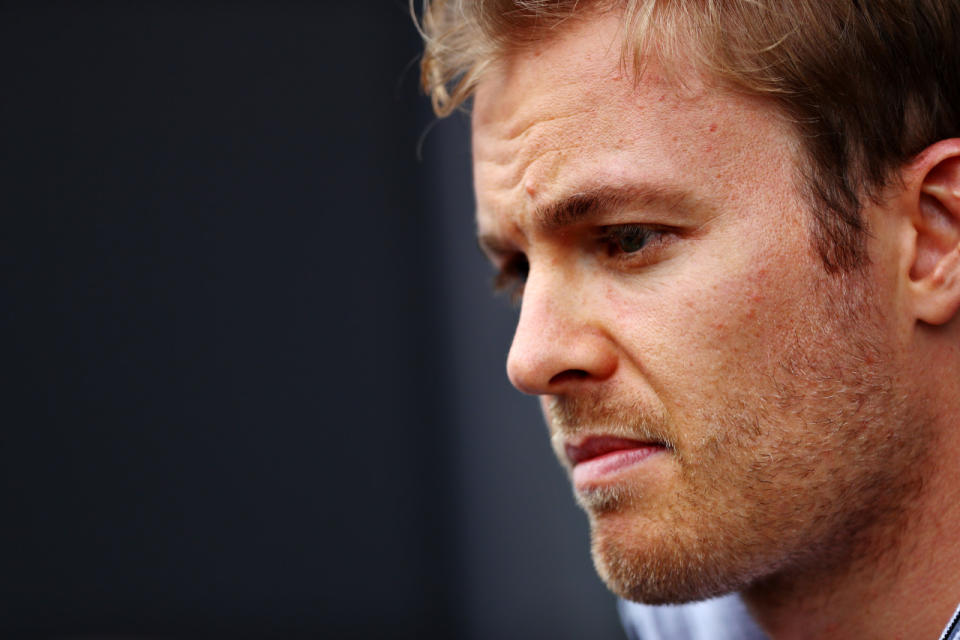
On lap 47, Rosberg (pictured) lost power. His engineer immediately gave him an engine mode (chassis default zero-one, if you’re interested).
He then told Rosberg to skip seventh gear, to which Rosberg responded: ‘What do you mean, skip seventh?’
The engineer then told him to double-shift from sixth to eighth gear.
Now, that’s coaching the driver. It seems like perfectly sensible advice to pass on to the driver of a broken car, but it’s against the rules.
F1’s radio transmission rules prevent all sorts of information being imparted to drivers, the aim being to ensure they drive ‘alone and unaided’.
They’re poorly designed rules and, not that long ago in Baku, you may recall Hamilton getting het up when his team refused to break the rules by telling him which engine mode he needed to be in to cure a fault.
At Silverstone, Rosberg was handed a ten-second penalty so it’s clear the stewards believe Mercedes broke the rules.
Now, had Rosberg not been given that advice, would he have fallen back down the field? Probably. Would he even have finished? There’s no way of telling.
Would he have wasted more than ten seconds trying to work out how to deal with his problem? Judging by his radio transmissions, the answer to that is a huge yes.
In other words, yet again a penalty was handed out that in no way reflected the severity of the offence and the advantage gained from it. Expect more teams to break communications rules now they know how feeble the punishment is likely to be in relation to the potential gains.
One footnote to this nonsense. The word is that the pit radio rules are going to be made even more restrictive, and there will be even less chance of teams trying to help drivers sort out problems with their impossibly complicated control systems, so that they can concentrate on doing what they’re best at: driving.
Ham’s the man. Again
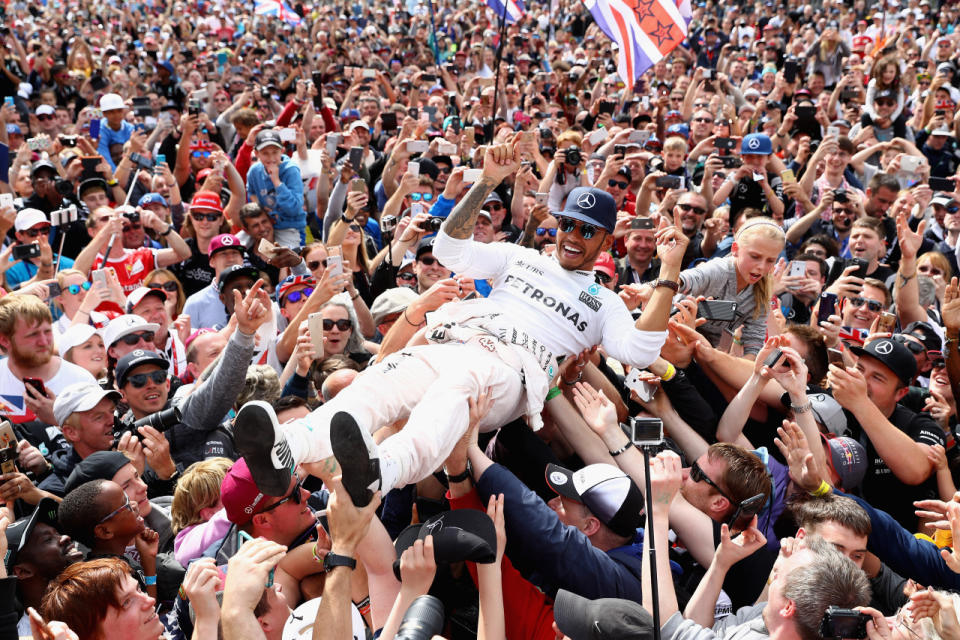
Hamilton’s race win puts him within four points of Rosberg in the championship (as well as equalling Nigel Mansell’s impressive win tally at Silverstone).
But it was watching him in qualifying that made it so apparent what an advantage Hamilton (pictured crowd-surfing after his win) now has over his team-mate. In Q3, his initial pole-winning lap was disallowed because he’d exceeded track limits at one of the corners.
So Hamilton promptly went out, pressure on, and delivered another scorcher of a lap.
Thing is, that scorcher wasn’t even his fastest of qualifying. He was even faster in Q2 and, on the evidence of that performance, I reckon he’s got between 0.3 and 0.5 seconds of lap pace in the bag for when he needs to keep Rosberg in check.
That’s why, when Hamilton gets in front, it’s game over for everyone else. He can manage his race pace with effort to spare.
That’s important not just because it keeps opponents behind him. It also allows him to turn down the stresses on his car.
At Silverstone, Hamilton said he was managing the engine – he’s had a lot of mechanical problems and, soon, he’ll start to pick up penalties when he fits new engines.
Don’t underestimate how important this is. If Hamilton can drive hard to get into a commanding position, and then turn the wick down, he’ll make his power units and gearboxes last longer, and pick up fewer penalties.
He’ll also force Rosberg into pushing his car to the limit and, as we saw this weekend, that increases the chance that Rosberg hits mechanical problems.
Talking of how he can keep the pressure on Rosberg…
Ice, ice baby
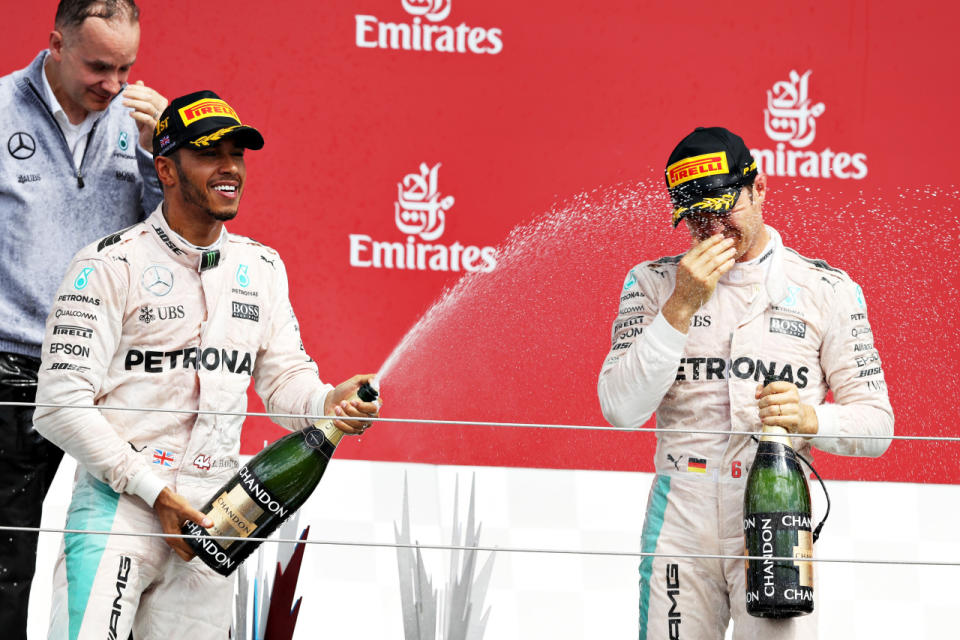
You know how Mercedes keep saying everything is cool between their warring drivers?
In the green room before the podium ceremony, it looked suspiciously like everything was not so much cool, as bitterly frozen.
Hamilton and Rosberg (pictured) didn’t exchange a word. It was embarrassing to watch.
Hamilton did eventually chat to third-place wonder-kid Max Verstappen, and they discussed how Verstappen had been managing to catch Rosberg.
Think about that. Rosberg is standing silently, presumably wanting to get away from the cameras as soon as he can, and then his team-mate gets involved in a brief conversation about how good Verstappen’s performance was relative to Rosberg’s.
Ouch.
It’s the second time Hamilton has homed in on Rosberg’s championship lead this season, and Rosberg’s thrown away a big advantage in the process. He’s going backwards, and no one is more aware of that than Hamilton.
On the podium, Hamilton made a point of saying about Rosberg ‘I’m catching him’ – and it wasn’t delivered in a friendsy-wiendsy way.
Within Mercedes, the mind games are in full swing and, on this evidence, Hamilton is winning by a country mile.
Max, you star
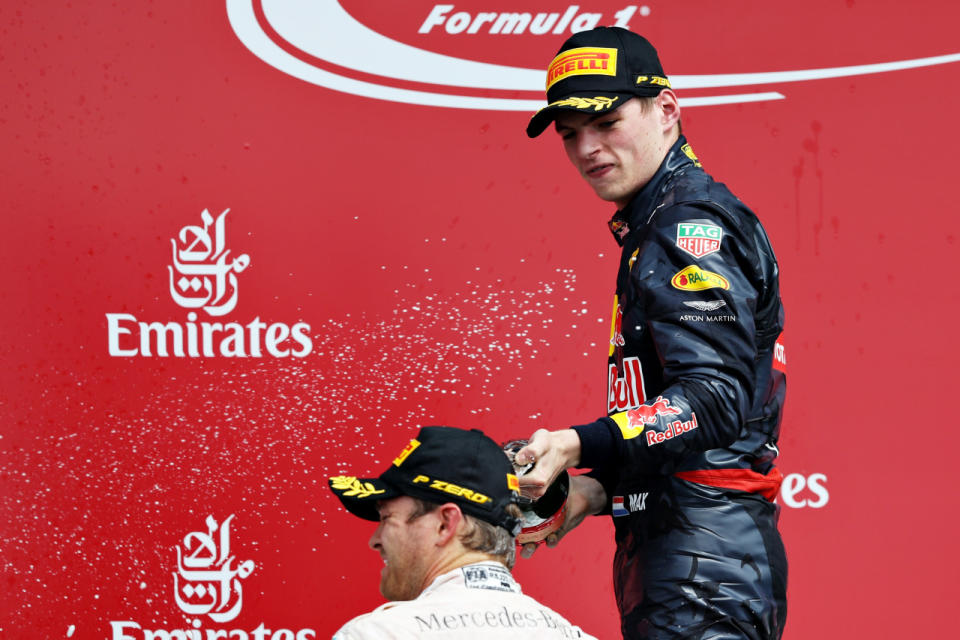
When it comes to on-track performance, the stand-out driver of the weekend was Max Verstappen (pictured). He picked up his third podium – one more than his dad managed – and yet again outscored team-made Daniel Riccardio.
Riccardio has been at pains to remind us that there have been good reasons he has lagged behind Verstappen on track, and he has always smashed him in qualifying.
Until this weekend, that is. Verstappen looked far more at home on the high-speed corners of Silverstone – his race-day battle with Rosberg was a proper highlight – and he comfortably out-qualified his Aussie team-mate.
Like Mercedes, Red Bull have two drivers capable of being champions. Like Mercedes, Red Bull appear to be leaving Ferrari behind in terms of car development (thank you Renault, at last).
Unlike Mercedes, their drivers haven’t turned against each other. Yet.
Watch this space.

 Yahoo Sport
Yahoo Sport 





































